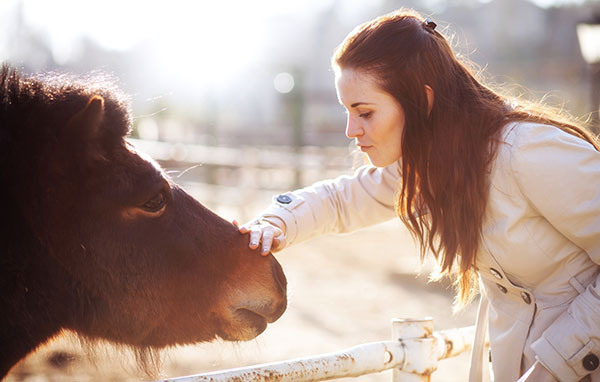寓教于乐:父母就是孩子最坚固的「脚手架」
Scaffolding: How Parents Can Promote Learning Through Guided Play
寓教于乐:父母就是孩子最坚固的「脚手架」
壹心理翻译社 ◎ 荣誉出品
原作 | Vanessa LoBue PhD
翻译 | Jenny_Z
校编 | Phoebe_菲贝,张真Derek
注:为方便具有英文阅读习惯和需求的读者,我们在译文发表的同时,附上了英文原文。在部分译文的处理上,我们进行了二次编辑,以求更接地气、更容易理解的表达,因此并非所有译文都和英文原文100%对应。原文链接可在文末找到,提醒有需要的读者留意。
How children learn is something that we are all interested in, some of us from a scientific perspective, others from a policy perspective, and most of us from the perspective of a parent.
我们都很好奇孩子是如何学习知识的,不管是从科学的角度,从政策的角度,还是绝大多数人从为人父母的角度。
Watching my son figure out something new—like how to fit wooden blocks into a shape sorter or how to make his music box play—is both fascinating and exciting for both the mom and the researcher in me. At the ripe old age of two, every day offers him a new discovery, and I am more than happy to sit back and watch as he learns from the world around him.
从我作为母亲和研究人员的视角看来,观察我儿子探索新世界,例如拼接木块或者玩音乐盒,都是一件迷人且令人兴奋的事。在他长大到两岁的时候,他每天都在探索新的事物,而我就坐在他身后看着他从身边的世界里不断学习。
Some researchers have likened infants to "baby scientists"—experimenting with their environments on their own to learn new things. Like scientists, children do learn new things by experimenting with the world, but the truth is, very few actual scientists work alone. In fact, scientists often accomplish the most when they work in groups or in pairs, and it turns out that the same can be true for young children.
有些人称婴儿为“小宝贝科学家”,因为他们为了了解身边的世界而不断的探索着。孩子们和科学家一样,通过做实验来学习新的东西。事实上,只有少数科学家是自己一个人做研究的,绝大多数都是团队合作完成,或至少是两个人一起。这个特点在小孩子身上也是一样的。

Consistent with this idea, a very famous psychologist from the early 1900's named Lev Vygotsky proposed something quite revolutionary for his time.
前苏联著名发展心理学家利维·维谷斯基(Lev Vygotsky)在20世纪初提出了一个在当时极具革命性的概念。
He suggested that children might accomplish the most when they work with someone smarter than them. He described the zone of proximal development, which is what a child can achieve with the help of an adult, often their moms.
当孩子和比他们聪明的人一起时,孩子能获得更大的成就。这就是教育心理学人尽皆知的“最近发展区(zone of proximal development)”概念 —— “比现在的我做得更好一点点”,就是“最近发展”,而孩子可以在成年人的帮助(多数时候是母亲的帮助下)实现这份“最近发展”。
Within the zone, parents can scaffold behaviors for their children by providing instruction and guidance, much like the scaffolding on buildings provides those structures with support so that they can grow to reach their greatest height.
在这个发展区里,父母为孩子的行为提供了如同脚手架作用的指引和指导, 而孩子就可以在这种帮助下达到他们所能到达的最高处。
Luckily, scaffolding isn't something that most parents have to work too hard at—they do it naturally just by talking to or playing with their kids.
庆幸的是,为孩子提供这种支持并不是难事(这有个很形象的说法:为孩子架起“脚手架(scaffolding)”,家长们要做的也就是和平常一样,陪孩子聊天啊玩耍啊之类的。

In fact, you can probably see examples of scaffolding any time you watch a mom talk to her baby. Babies love to see their moms smile at them, so a simple smile can act as a positive reinforcement or scaffold, encouraging the baby to repeat whatever it was that made her grin in the first place. Thus, by providing a loving smile, laugh, or pat on the back, moms can inadvertently help their babies learn.
其实很多时候你看一位母亲在和她的宝贝说话时,就是她在搭建脚手架。孩子们非常喜欢看到母亲对着他们笑,简单的笑容起到的是正面巩固和脚手架的作用。它鼓励孩子去重复他们刚才那个让大人微笑的动作。所以母亲的一个有爱的微笑,爽朗的笑声,或者轻拍孩子背部都在很大程度上帮助孩子们学习。
For example, researchers interested in how moms shape their babies' language learning trained moms to reinforce their 8-month-olds whenever they babbled by simply smiling and moving closer to them. After just a short session in the lab, the babies who's mothers reinforced their babbling babbled more, and they babbled better (using sounds that more closely align with English sounds) than babies who were not reinforced.
有一个研究是母亲通过微笑和靠近孩子的方式作为鼓励,来训练8个月大年纪婴儿的语言学习。在进行了非常短的一轮实验之后发现,在牙牙学语的时候接受到鼓励的一组婴儿,比没有接受鼓励的一组开口说话次数更多、也更好(发出的音更接近单词发音)。
Further, when mothers responded to their babies' babbles by repeating similar sounds, babies modified their babbles to match the sounds that their mothers made, also resulting in more mature babbling. I see the very same thing happening every day in my own home: My son says a word, I smile and repeat it, he then repeats the word again to me, only this time better and more clear than the first time.
更进一步的实验发现,当妈妈们的反馈是笑着重复一个相似的发音时,宝贝们会尝试调整他们的发音,去靠近妈妈发的声音,并且他们更愿意开口了。其实我每天在家里都能看这个现象:我儿子说一个单词,我笑着重复一边,接着他又再次重复给我,而这次比第一次说得更好更清晰。

Importantly, parents can also scaffold behaviors during playtime that might help their children learn new and important problem-solving skills. For example, researchers who studied how parents might help their 2-year-olds during problem solving tasks presented parent-child pairs with a set of blocks and asked them to build a tower by stacking the blocks according to their sizes. During the interactions, parents were really good at knowing when to give their children hints and instructions in order to boost the child's ability to successfully create a tower. In fact, moms were especially good at both leading their children through the task while at the same time, allowing the child to spend some time off task exploring freely.
更重要的是,家长在陪孩子玩的过程中可以帮他们学习新东西以及解决问题的重要技巧。例如:有人研究父母是怎么帮助两岁大的孩子解决困难的,他们让孩子和家长一起搭建积木。过程中就发现父母都非常清楚的知道什么时候该给孩子提示了,好让他们能完成积木塔的搭建。 特别想说的是妈妈们,她们在知道如何帮孩子完成任务的同时,还能给孩子最够的时间去自由的探索和发挥。
Based on this work, it appears that parents are already pretty good at guiding children's learning during play without going out of their way or doing anything special. But, if you're feeling like you want to do a little more, there is also research demonstrating additional learning benefits when children are engaged in guided play, or play that involves the guidance of a parent.
这些研究都清晰地说明父母们知道如何寓教于乐,他们不用改变自己也不用做任何特殊的事情。当然,如果你觉得你想更加进一步,也有相关研究表明孩子在有明确的指导或指示的情况下玩耍能学习到更多。
Parents don't have to do much here either, as asking simple questions during playtime can often promote learning.
其实关于这一点作为父母也不需要做太多额外的事情,仅仅在过程中提简单的问题就能提高效果。

For example, research has shown that children learn more about engineering when parents asked simple open-ended questions about skyscrapers while children tried to build one with blocks.
举例来说:学者们发现在孩子玩积木的时候被问到简单的关于摩天大楼的开放性问题,他们就会学到更多关于工程的知识。
Similar research suggests that children learn more about the function of a new toy if parents ask the child to provide explanations for how it might work. The key here is to provide hints and ask questions to encourage children to explore, without providing too much direct instruction.
另一个相似的研究发现:当家长让孩子解释他们的玩具是什么原理时,孩子们能发掘出玩具更多的功能。这里的重点是通过给提示和提问,但是不给明确目标的方式,让孩子自己去发掘和探索。
Indeed, children learn more by exploring themselves than by watching an adult do something for them, and they explore more if parents don't provide explicit instructions about how to use a new toy.
事实上,与观察父母如何表现相比,孩子们通过自己动手探索的方式能学到更多;并且如果家长不给关于怎么玩玩具的明确提示,孩子们往往更愿意去研究它。
The point of all of this is that children learn by playing, and most importantly, although they can learn by playing on their own, they can often learn more when playing with someone who's smarter than them, someone like mom or dad.
总得来说,孩子们在玩的过程中学习。并且更重要的是,和比他们聪明的人一起玩,例如父母,孩子们就能学习到更多。
This doesn't necessarily mean that you have to be thinking about teaching your child during playtime; again, you will likely scaffold behaviors for your child without even thinking about it.
这里并不是说在陪孩子玩的时候要想着教他什么,而是在你没有察觉的情况下肯已经给孩子提供了帮助。
But by providing helpful hints and asking simple questions, parents can give children the support they need to reach their full potential: Much like the scaffolding on a building, playing with parents gives children just enough support to help them stand on their own.
当然了,如果能给他们提示,并且问一些简单的问题,父母则是可以帮助孩子发掘他全部潜能的。就如同建房所需要的脚手架,家长陪同孩子一起玩就是给予孩子们的最大支持和帮助。
英文原作:How Parents Can Promote Learning Through Guided Play (Psychology Today)
作者简介:Vanessa LoBue 博士,罗格斯大学心理学副教授,主要擅长婴幼儿发展。她是儿童学习中心主任,同时也是一位母亲。
译者简介:Jenny_Z,壹心理翻译社 | 译员。加拿大维多利亚大学心理学专业毕业,喜欢蓝天,喜欢看海,喜欢听故事。心理学不是唯一的爱好,而是长久的追求,只因为她能让你我都变得更好。
© 本译文由壹心理翻译社译员与壹心理联合原创首发,文中内容不代表壹心理或译者立场。转载前需获得我方授权,请联系邮箱:derek@xinli001.com
发布于: 2018-03-06
©️文章转载/侵权,请联系邮箱:content@xinli001.com











instruction是指令的意思
没爸妈呢
嗯